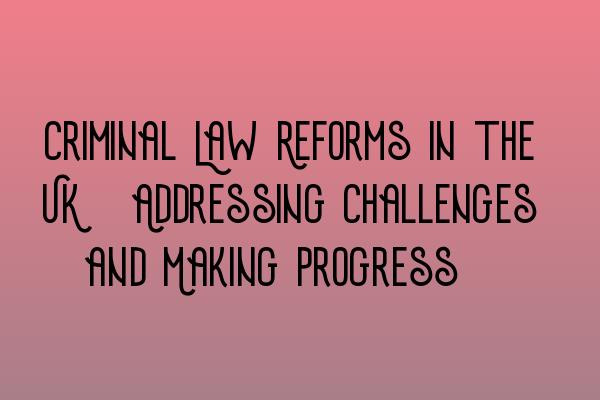Criminal Law Reforms in the UK: Addressing Challenges and Making Progress
Introduction to Criminal Law Reforms:
The field of criminal law is constantly evolving to meet the challenges of an ever-changing society. As the legal landscape continues to evolve, it is essential for legal professionals to stay up-to-date with the latest criminal law reforms in the UK. This blog post aims to shed light on the recent criminal law reforms implemented in the UK, the challenges they aim to address, and the progress being made.
The Need for Criminal Law Reforms
In recent years, the UK has witnessed significant changes in various aspects of society, including advancements in technology, globalization, and shifts in societal values. These changes bring about new challenges that require corresponding legal adaptations.
One of the key challenges faced by the criminal justice system is the rise in cybercrime. With the increasing reliance on digital platforms, criminals have found new avenues to engage in illegal activities. To address this challenge, the UK government has introduced reforms that adapt criminal laws to encompass acts committed online and enhance the investigative capabilities of law enforcement agencies.
Another significant area of concern is the issue of sentencing. The public’s perception of justice is always evolving, and there is a growing emphasis on ensuring that punishments are fair, proportionate, and effective. As a result, criminal law reforms have been introduced to promote more consistent sentencing guidelines and to address disparities in sentencing practices.
Progress in Criminal Law Reforms
The UK government, in collaboration with legal experts and professionals, has been proactive in addressing the challenges faced by the criminal justice system. Substantial progress has been made in various areas:
1. Cybercrime Legislation
The government has developed comprehensive legislation to combat cybercrime effectively. This includes specific offenses related to hacking, identity theft, online fraud, and other illicit activities conducted through digital platforms. These reforms aim to ensure that criminals can be held accountable for their actions in the virtual world.
2. Sentencing Guidelines
The Sentencing Council has established clearer guidelines to promote consistency in sentencing decisions. This allows judges to consider the individual circumstances of each case while ensuring fairness and proportionality in the sentencing process. Such guidelines help in reducing potential biases and unnecessary disparities.
3. Rehabilitation and Alternative Sentencing
A comprehensive approach to criminal justice involves not only punishment but also rehabilitation. With this in mind, the UK government has introduced reforms aimed at providing offenders with opportunities to reform and reintegrate into society. Alternative sentencing options, such as community service and rehabilitation programs, are being actively encouraged to reduce the burden on the prison system while promoting rehabilitation and reducing reoffending rates.
Conclusion
It is evident that criminal law reforms in the UK are constantly adapting to address new challenges. With the rise of cybercrime and the need for fair and consistent sentencing, the legal landscape is evolving to ensure justice is served effectively. Legal professionals must stay abreast of these reforms to better serve their clients and contribute to a fair and just society.
If you are preparing for the SQE exams, it is crucial to be well-versed in criminal law and the reforms that shape it. Make sure to check out our related articles for a more comprehensive understanding:
- SQE 1 Practice Exam Questions
- SQE 1 Practice Mocks FLK1 FLK2
- SQE 2 Preparation Courses
- SQE 1 Preparation Courses
- SRA SQE Exam Dates
We hope these resources will assist you in your SQE preparation and provide you with the knowledge and skills necessary to navigate the criminal law reforms effectively.
